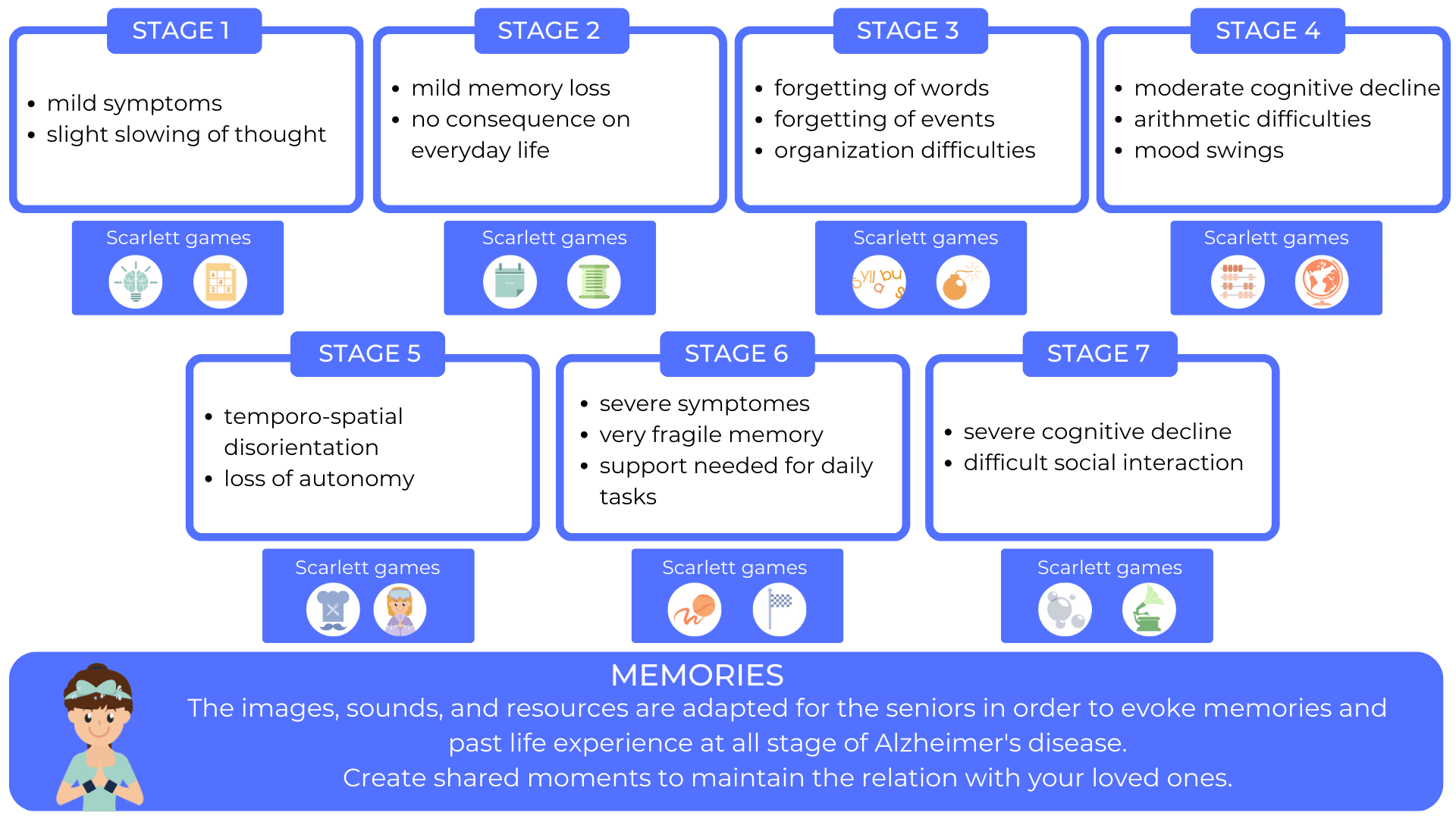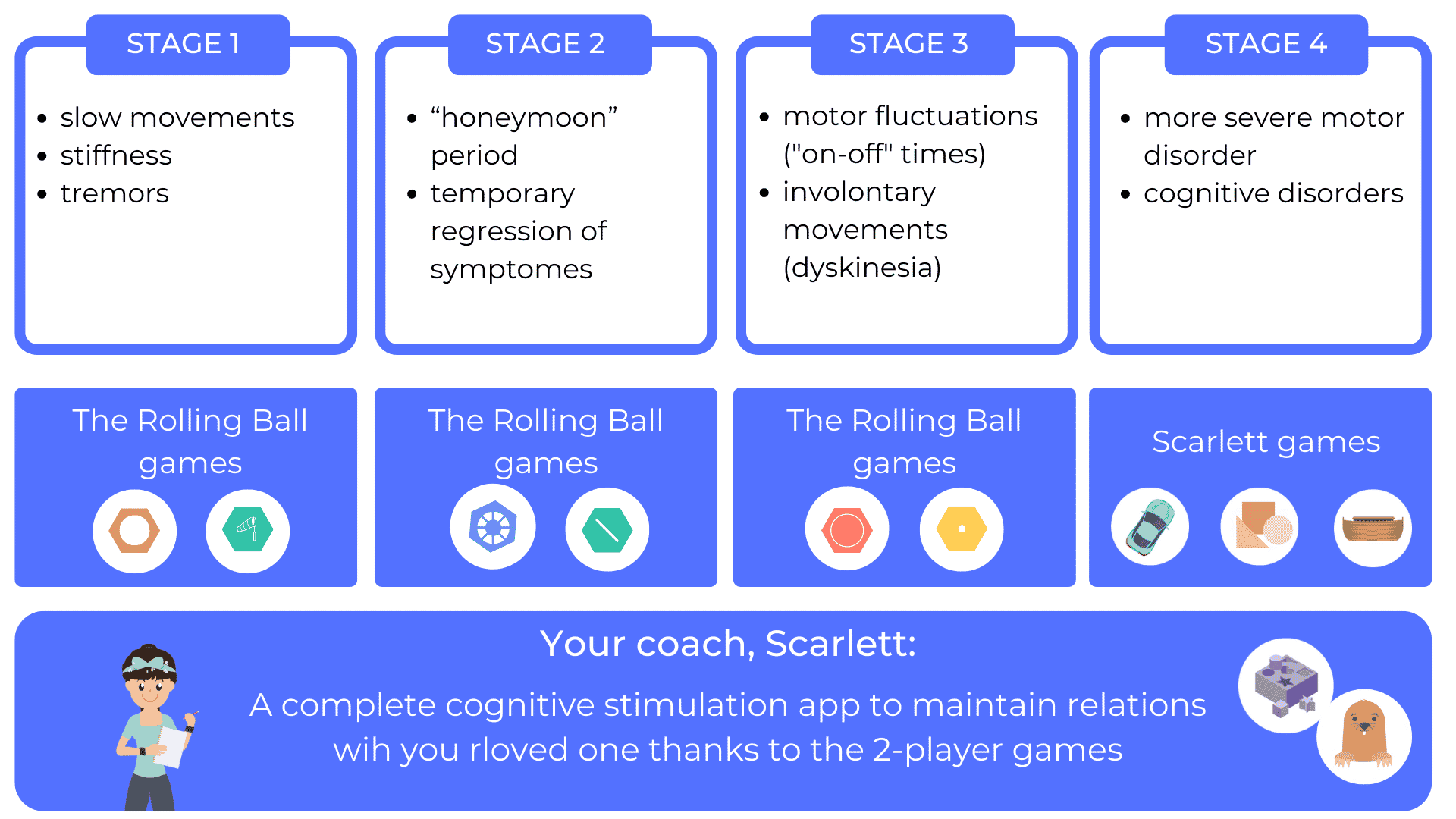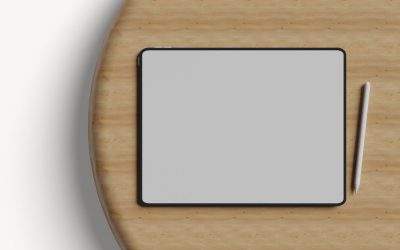Memory workshops are an important activity in the memory care centers because they help maintain or improve the cognitive abilities of the residents. Memory workshops are a fun way to keep residents active and engaged, while helping them maintain their mental health. In this article, we will discuss how to organize a memory workshop in memory care.
1) Determine the needs of the residents
The first step in organizing a memory workshop is to understand the needs of the residents. Each resident has different cognitive abilities and needs. It is therefore important to discuss with the residents and their families what they would like to see in the workshop. In addition, it is important to consider the interests of the residents when planning the workshop. For example, if a resident loves music, you can incorporate songs into the workshop.
2) Choose a theme for the workshop
Choosing a theme for the workshop is important because it gives the workshop a direction. Popular themes for memory workshops include childhood memories, historical events, travel, cooking recipes, etc. It is important to choose a theme that interests the residents and allows them to recall good memories.
3) Prepare the material
Once you have chosen the theme of the workshop, it is time to prepare the materials. You will need office supplies such as pencils, pens and paper, as well as other supplies specific to the theme you have chosen. For example, if the theme is childhood memories, you can have childhood photos, retro toys and other items that remind you of childhood.
4) Plan the activities
It is important to plan workshop activities to keep residents engaged. Activities can include memory games, quizzes, puzzles, songs to sing together, etc. Activities should be tailored to the cognitive abilities of the residents and be fun to keep them engaged.
5) Encourage active participation
It is important to encourage the active participation of residents during the workshop. This can be done by asking questions and encouraging residents to share their memories and experiences. Residents can also be encouraged to work together on activities to strengthen social ties.
6) Take regular breaks
It is important to take regular breaks during the workshop to allow residents to rest and recharge. Breaks can be used to provide snacks, beverages and informal discussions. Breaks can also be used to allow residents to socialize and get to know each other.
7) Evaluate the workshop
After the workshop, it is important to evaluate its success. You can do this by asking residents and staff members for feedback on the workshop. You can also evaluate the workshop by observing the residents’ participation and level of engagement during the workshop. These evaluations can be used to improve future workshops and better meet the needs of residents of the memory care facility.
8) Involve staff
The memory care staff must be involved in the organization and implementation of the memory workshop. They can help with material preparation, activity planning and workshop set-up. They can also help encourage residents to participate and maintain a friendly and stimulating environment.
9) Use technological tools
Technological tools can be used to improve memory workshops in the memory care facility. Tablets, computers and interactive games can be used to create stimulating activities for residents. These tools can also help evaluate the success of the workshop by collecting data on resident participation and engagement.
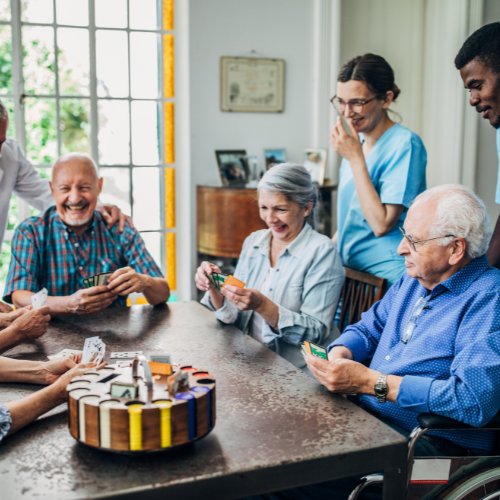
10) Schedule regular workshops
Finally, it is important to schedule regular memory workshops to keep residents engaged. Workshops can be scheduled weekly, monthly or on another schedule that suits the memory care. Residents may also be encouraged to organize their own workshops or participate in small group activities.
In conclusion, memory workshops are an important activity in memory care to maintain or improve the cognitive abilities of residents. To run a successful memory workshop, it is important to understand the needs of the residents, choose a suitable theme, plan the activities, encourage active participation, have regular breaks, evaluate the workshop, involve the staff, use technology tools and schedule regular workshops. Memory workshops are a fun way to keep residents active and engaged while maintaining their mental health.
Cognitive functions stimulated during memory workshops
Memory workshops are very useful for seniors. Through these workshops, you can work on memory, attention, language and peer relationships. Indeed, it is necessary to do activities that stimulate the brain, but also the emotional and relational side of seniors.
The memory workshop is the perfect solution. The memory workshop is done in small groups, which allows for exchange and discussion among peers. In addition, by using the memories and experiences of seniors, they can be happy to share their lives and experiences.
Because of the advantages we have just seen, seniors are motivated to carry out activities. The activities are designed to stimulate the cognitive functions of seniors, starting with the most fragile cognitive functions:
- Memory: memory is the cognitive function that allows us to store information related to our experiences (memories) or general concepts (knowledge). There are therefore several types of memory depending on the information processed.
- Attention: attention allows us to stay focused on an activity. The memory workshop is organized in several steps, so the person must succeed in keeping his attention on the activity (focused attention), but also pay attention to the other participants and their interventions (shared attention).
- Language: during the memory workshop each person has to exchange with the other participants and to do so they use language. Indeed, language is very important for speech and comprehension.
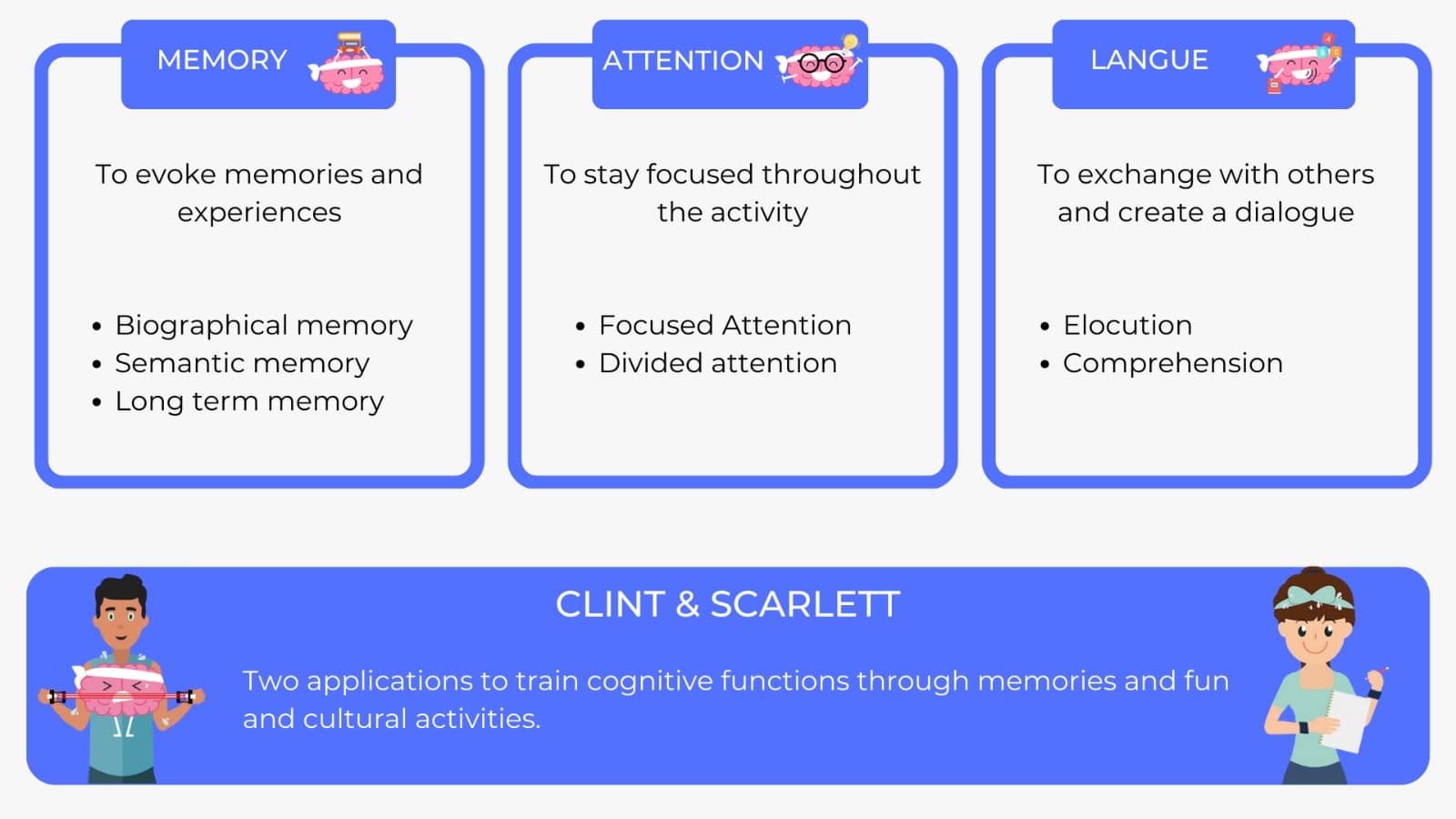
The memory workshop in memory care
When a senior arrives in memory care, he or she has weaknesses that can be physical or cognitive. The goal of caregivers is to slow cognitive decline. For this reason, in memory there are often activities organized with this objective, like memory workshops.
In memory care, it is important that a caregiver (activity director, life enrichment director, psychologist, etc.) leads the workshop to help the participants follow the activities and participate. The memory workshop has even more value in the memory care. Seniors may feel far from home or have difficulty talking about their personal experiences since they are away from their families. The workshop becomes the place where the person can talk about him or herself, about his or her life and share something personal.
In addition, seniors in nursing homes often have memory problems, so it is important to stimulate their memories. For example, in the case of Alzheimer’s disease, the person may relive events from their past. In this case, images or sounds can help evoke memories. In memory care, there may also be people who suffer from Parkinson’s disease. In this case the memory workshop can be useful to stimulate language and object manipulation.
Discover useful tools to set up memory workshops in memory care
CLINT and SCARLETT,
your memory coaches
Clint and Scarlett are two memory programs on a tablet. Scarlett is the easiest version for seniors with important frailties (Alzheimer, Parkinson..). Clint is a more difficult version for adults or senior citizens at the prevention level. In these applications you will find more than 30 games to stimulate the cognitive functions. The games are adapted to the age of the seniors, so they are perfect to create a memory workshop. The tablet screen can be projected onto a large screen, to adapt the activity to a group.
A Card A Date
In this game the person has to put historical events in the right order.
Seniors can share their memories of a particular event or talk about their lives at that time. There are different categories of games so you can adapt the game to the interests of the seniors or the theme of the workshop. You can find events related to history, science, sports…
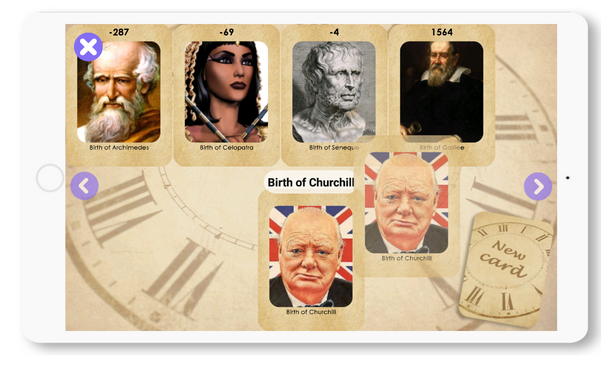
Around the world
In this game, the person must find a place on the map.
You can choose the US states or the map of Europe (with the European countries). You can talk about a city or state, their characteristics or ask seniors if they have ever traveled.
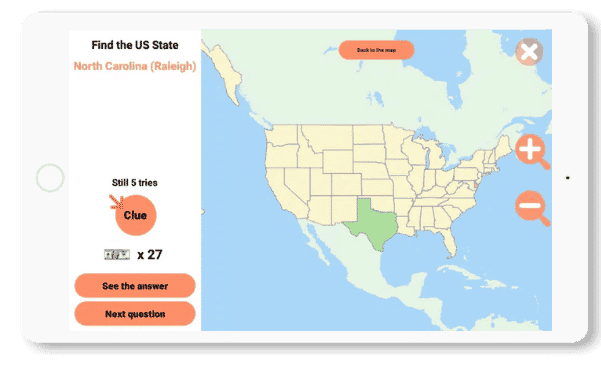
Granny Cooks
In this game, you have to find the ingredients of a recipe.
This game allows to work on memory but also to exchange on the variations of a recipe. Everyone prepares the same dish in a different way according to their habits or their department of origin. In addition, food is often linked to personal events. For example, there are typical Christmas dishes, Easter dishes or a person’s favorite dish cooked on their birthday.
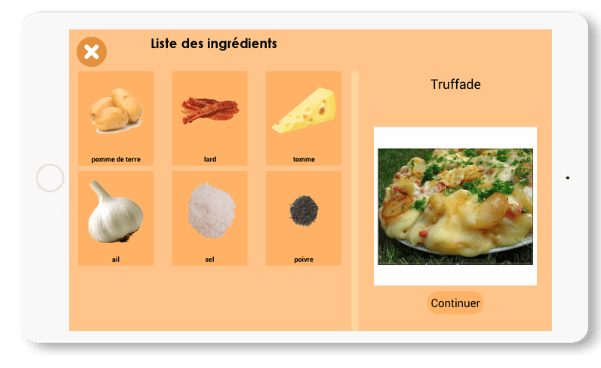
Quizzle
In this game, the person must answer general knowledge questions.
Memory is also related to general knowledge. Culture questions can be a fun way to stimulate the brain. The questions are adapted to the French culture and to the era of the seniors, so they can also evoke memories.
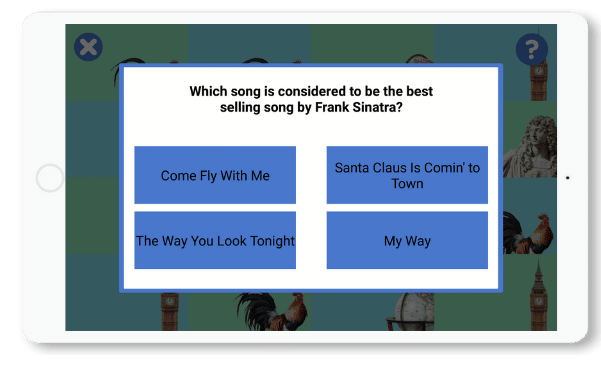
A PROGRAM IN PREVENTION
OR MILD MENTAL LOSS
CLINT
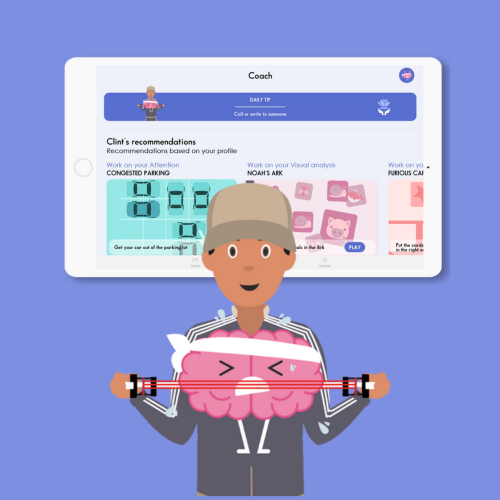
A PROGRAM TO SUPPORT PEOPLE WITH ALZHEIMER’S DISEASE
SCARLETT
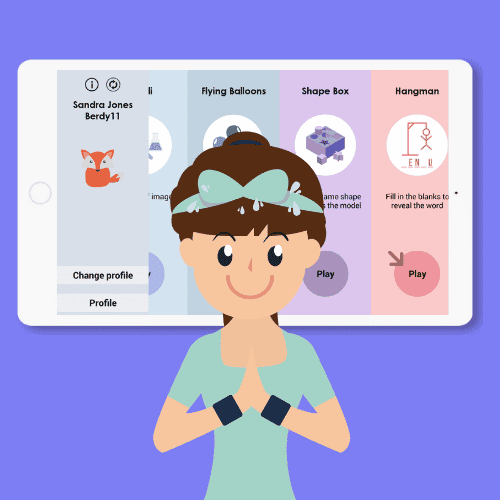
Other articles that might interest you:
The Role of Cognitive Apps in Speech Therapy for Alzheimer’s Patients
Alzheimer’s disease is a progressive neurological disorder that primarily affects memory, thinking, and behavior. As...
Memory Apps for Alzheimer’s: Enhancing Recall in Speech Therapy Sessions
Alzheimer's disease is a progressive neurological disorder that primarily affects memory, thinking, and behavior. As...
Cognitive Rehabilitation Apps for Speech Therapy with Alzheimer’s Patients
In recent years, the landscape of cognitive rehabilitation has evolved significantly, largely due to the advent of...


